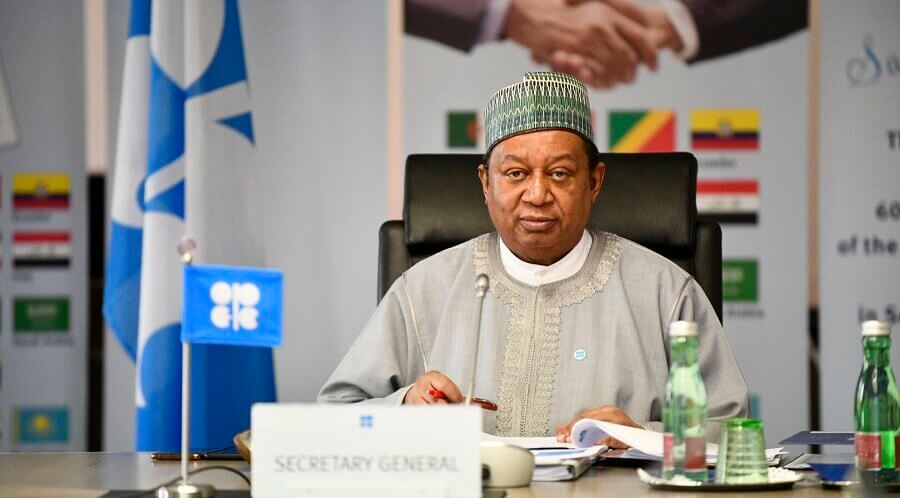Nigeria, Other Oil Producers Need $11.8trn Investment To Meet Growth In Energy Demand —OPEC
…Says New Regional Alignments Threatening Success Of Energy Security
A cumulative investments of $11.8trn would be needed between now and 2045 by Nigeria and other oil and gas producing countries to meet the growth in energy demand.
Advertisement
The Secretary General of the Organisation of Petroleum Exporting Countries, Mr Muhammad Barkindo said this on Tuesday in Abuja at the 2022 Nigeria Oil and Gas Conference.
The conference is being attended by oil and gas stakeholders in the private and public sectors of the Nigerian economy.
Barkindo told the gathering that OPEC projects that total primary energy demand will expand by a robust 28 per cent in the period to 2045.
He explained that oil is expected to retain the largest share of the energy mix, accounting for 28 per cent share in 2045, followed by gas at around 24 per cent.
Advertisement
The implication of this, according to him, is that oil and gas together will continue to supply more than half of the world’s energy needs for many decades.
He said, “In 2020, the first year of the pandemic and one of the darkest periods in the history of oil, upstream oil capital expenditure fell by around 30 per cent. This exceeded the colossal 26 per cent annual declines experienced during the severe industry downturn in 2015 and 2016.
“Looking further down the road, OPEC’s most recent World Oil Outlook give us some perspective on what is to come. It shows the global oil sector will need cumulative investments of $11.8trn in the upstream, midstream and downstream through to 2045 to meet expectations for significant growth in energy demand.
“With regard to demand, there is only one direction, and that is up. In fact, OPEC projects that total primary energy demand will expand by a robust 28 per cent in the period to 2045.
“Oil is expected to retain the largest share of the energy mix, accounting for just over a 28 per cent share in 2045, followed by gas at around 24 per cent. In other words, oil and gas together will continue to supply more than half of the world’s energy needs for many decades.
Advertisement
“These hydrocarbons are especially vital to the energy mix in regions like Africa, which will see massive population shifts and economic growth in the coming years. These developments increase the urgency of eradicating energy poverty.”
The OPEC Secretary -General explained further that the oil and gas industry is under siege as a result of the various challenges facing the sector.
He lamented the evolving geopolitical developments in Eastern Europe, the ongoing war in Ukraine, the ongoing COVID19 pandemic and inflationary pressures across the globe have come together in a perfect storm that is causing significant volatility and uncertainty in the commodity markets, more importantly, in the world of energy.
Against this backdrop, Barkindo stated that a number of industrialised countries and multilateral institutions have continued to pursue stringent policies aimed at accelerating the energy transition and fundamentally altering the energy mix.
In addition to these, the OPEC Boss explained further that the industry is still reeling from the enormous investment losses of recent years.
According to him, the industry has also been hit by two major cycles – the severe market downturn in 2015 and 2016, and the even more far-reaching impact of the COVID-19 pandemic.
Advertisement
Barkindo lamented that in OPEC’s 62-year history, spare capacity has never been as low as it is today, adding that this takes into account periods of war, natural disaster and other market shocks.
He told participants at the event that if this trend continues, it could haunt the sector in the future.
He added, “If our National Oil Companies are to continue to innovate and flourish, it is of utmost importance that they have predictable and unfettered access to investment capital.
“Regular investment at adequate levels is the lifeblood of our
industry. It is essential if we are to develop new technologies, strengthen our human capacity and remain leaders in innovation so that we can do our part to meet the world’s growing need for energy, shrink our overall environmental footprint, and expand access to underserved communities.
“Yet our industry is now facing huge challenges along multiple fronts, and these threaten our investment potential now and in the longer term. To put it bluntly the oil and Gas industry is under siege.”
Despite the challenges, the OPEC Boss said the Organisation will continue to support the growth and stability of the global oil market by continually expanding data exchanges, technical capacity and high-level cooperation with many leading oil-consuming countries, producers and institutions.
“Regrettably, we are seeing global energy cooperation becoming more fragmented.
New regional alignments are threatening to reverse years of progress towards creating a more stable and interconnected energy system.
“We cannot afford to allow multilateral energy cooperation and global energy security become collateral damage of geopolitics,” he added.



